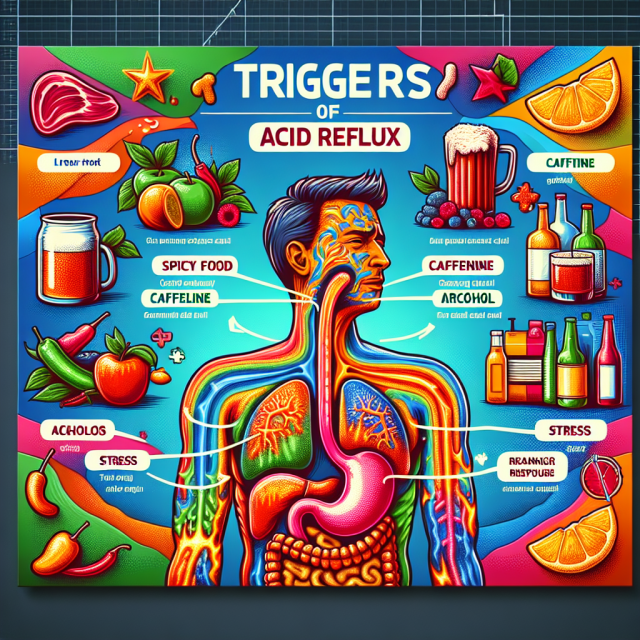
Table of Contents
| Sr# | Headings |
|---|---|
| 1 | Introduction |
| 2 | 1. Spicy Foods |
| 3 | 2. Fatty and Fried Foods |
| 4 | 3. Caffeine and Carbonated Drinks |
| 5 | 4. Alcohol Consumption |
| 6 | 5. Eating Before Bedtime |
| 7 | Conclusion |
| 8 | FAQs |
Introduction
If you suffer from acid reflux, you know how painful and disruptive it can be. It’s more than just heartburn; it’s a nagging discomfort that can ruin meals and disturb your sleep. Often, it feels like a constant battle between your stomach and your lifestyle choices. Understanding common acid reflux triggers can help you regain control and enjoy life without the burn.
1. Spicy Foods
Who doesn’t love the occasional spicy meal? But for those with acid reflux, spicy foods can be a big trigger. Chili peppers, hot sauce, and jalapeños are known culprits. They irritate the esophagus lining, leading to that familiar, burning sensation.
How to avoid them? Consider replacing spicy ingredients with milder seasonings like herbs or try less fiery options. If you’re craving flavor, experiment with non-spicy alternatives, like basil or cumin, to make your meals enjoyable without the burn.
2. Fatty and Fried Foods
Imagine pouring oil into a fire. That’s what fatty and fried foods do to your stomach acid. Burgers, fries, and creamy sauces are some of the biggest offenders. High-fat content relaxes the lower esophageal sphincter (LES), making it easier for stomach acid to flow back up.
How to avoid them? Opt for lean proteins like chicken or fish, and bake instead of frying. Making small changes, like switching from whole milk to skim, can make a significant difference. Think of your stomach as a balance scale—keep it even, and you’ll feel better.
Related link: HealingWell Community Support
3. Caffeine and Carbonated Drinks
Can’t imagine starting your day without a cup of coffee? Unfortunately, caffeine is a common acid reflux trigger. It relaxes the LES, allowing acid to escape. Carbonated drinks are equally troublesome. The bubbles can cause bloating, putting pressure on your LES and pushing acid upwards.
How to avoid them? Try swapping coffee for herbal teas, like chamomile or ginger. If you miss the caffeine boost, consider drinking half-caffeinated coffee. As for sodas, stick to flat beverages or water infused with fruit slices for a refreshing alternative.
4. Alcohol Consumption
Alcohol, whether it’s a glass of wine or a cocktail, is another acid reflux trigger. It relaxes the LES and increases stomach acid production. Alcohol can also lead to dehydration, making reflux symptoms worse. You might notice that even small amounts can leave you feeling uncomfortable.
How to avoid it? Moderation is key. If you’re at a social gathering, limit yourself to one drink and choose lower-acid options like dry wine. Better yet, stay hydrated and alternate alcoholic beverages with water. It’s about finding balance and making mindful choices.
External link: Mayo Clinic on Acid Reflux
5. Eating Before Bedtime
Do you often snack late at night? Eating right before bed can be a serious trigger for acid reflux. Lying down after a meal makes it easier for stomach acid to travel back into the esophagus. Your digestive system needs time to work, and gravity helps keep acid where it belongs.
How to avoid it? Make dinner your last meal of the day and finish eating at least three hours before lying down. If you get hungry before bed, opt for light snacks, like a banana or a small bowl of oatmeal. Think of your stomach as a delicate machine—it needs time to process before resting.
Conclusion
Managing acid reflux isn’t about deprivation; it’s about understanding your body’s needs and triggers. By identifying what sets off your symptoms, you can make mindful choices and live more comfortably. Start with small changes and listen to your body. Relief is possible, and every step counts.
FAQs
1. What are some natural remedies for acid reflux?
Natural remedies include drinking ginger tea, chewing gum to increase saliva, and eating smaller, frequent meals. These methods can help neutralize stomach acid.
2. Can losing weight help reduce acid reflux symptoms?
Yes, weight loss can help. Excess weight puts pressure on the stomach, increasing the risk of acid reflux. Losing even a few pounds can make a difference.
3. Is it safe to use over-the-counter medications long-term?
OTC medications like antacids or proton pump inhibitors can be used occasionally. However, long-term use should be discussed with a doctor to avoid complications.
4. How does stress affect acid reflux?
Stress doesn’t cause acid reflux but can worsen symptoms. Stress management techniques like meditation or deep breathing can help reduce flare-ups.
5. Are there specific foods I should avoid completely?
Common trigger foods include citrus fruits, tomatoes, spicy dishes, and fried items. However, everyone’s body is different, so keeping a food diary can help you identify your unique triggers.





